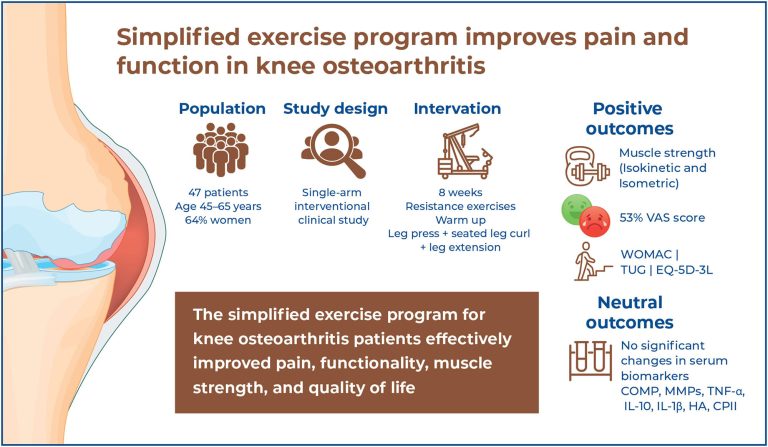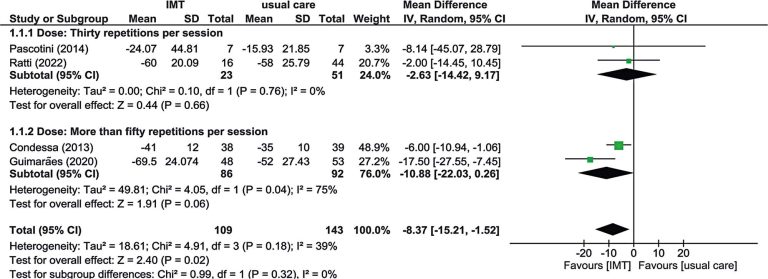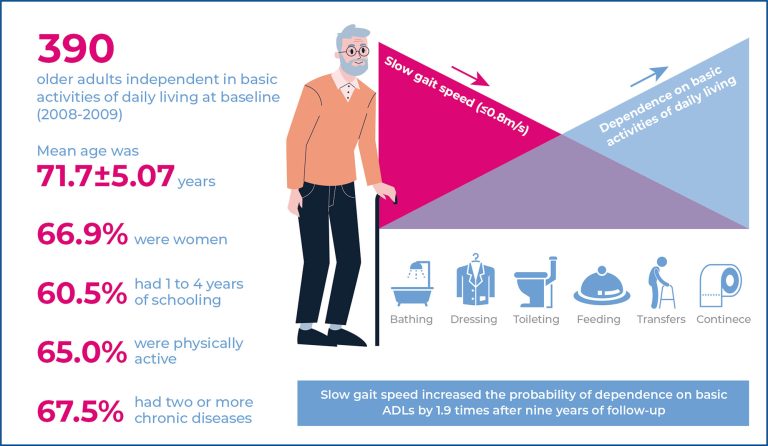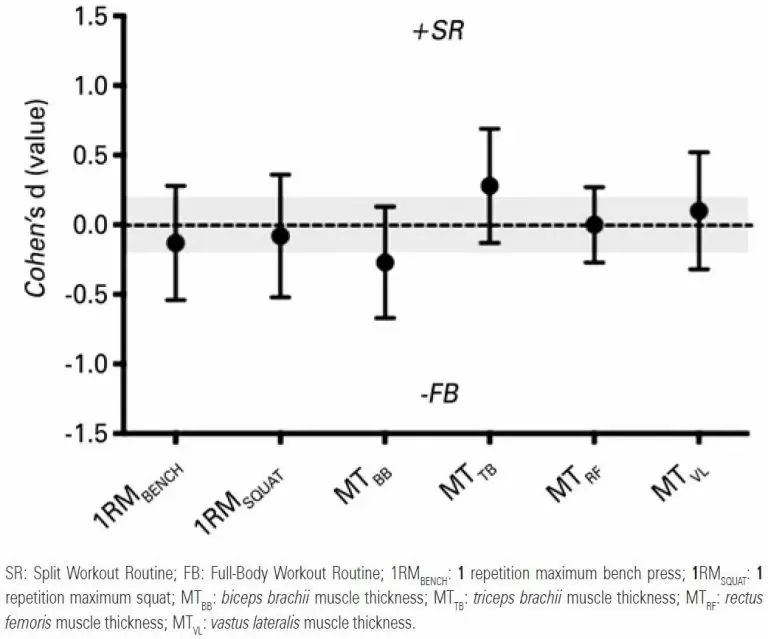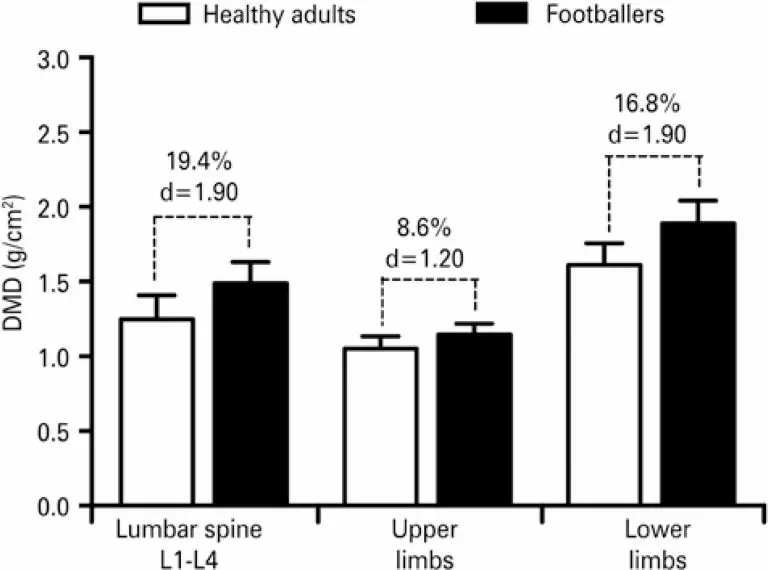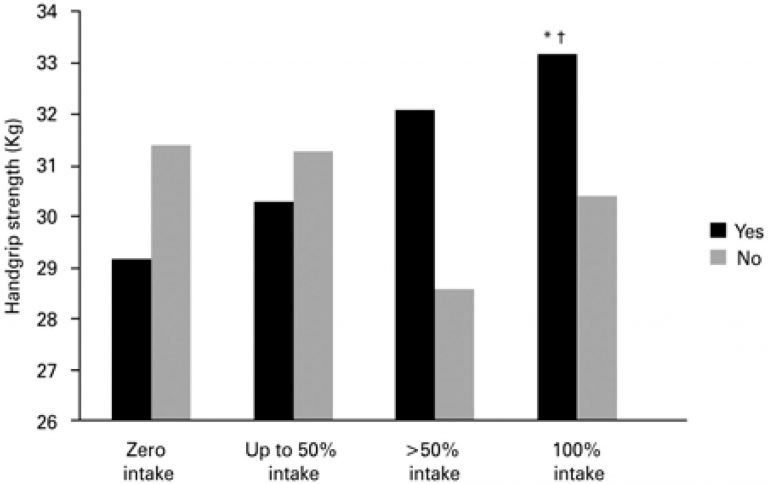13/Nov/2025
Effect of simplified exercise program on quality of life, biomarkers, pain and muscle strength of individuals with knee osteoarthritis
DOI: 10.31744/einstein_journal/2025AO1192
Highlights ■ The exercise program reduced the WOMAC score by 50%, VAS score by 53%, and improved isokinetic strength. ■ There were no significant changes in levels of serum COMP, MMPs, or pro-inflammatory cytokines. ■ Biomarker levels did not correlate with clinical improvement outcomes. ■ This exercise program is feasible for knee osteoarthritis management in primary care. ABSTRACT Objective: To evaluate a simplified exercise program for patients with knee osteoarthritis in terms of pain, functionality, muscle strength, and quality of […]
Keywords: Biomarkers; Exercise therapy; Muscle strength; Osteoarthritis, knee; Pain measurement; Quality of life
02/Jul/2025
Inspiratory muscle training for chronic critically ill patients: a systematic review and meta-analysis of randomized controlled trials
einstein (São Paulo). 02/Jul/2025;23:eRW1134.
View Article02/Jul/2025
Inspiratory muscle training for chronic critically ill patients: a systematic review and meta-analysis of randomized controlled trials
DOI: 10.31744/einstein_journal/2025RW1134
ABSTRACT Objective To systematically review and analyze studies investigating the efficacy and safety of inspiratory muscle training in adult chronic critically ill patients. Methods The MEDLINE, Embase, CENTRAL, LILACS, Clinical Trials Registry, and World Health Organization databases were queried on November 24, 2022 and January 22, 2025. The review was conducted in accordance with the PRISMA guidelines. RevMan V5.4 was used to analyze mean differences or standardized mean differences and 95% confidence intervals (95%CIs) for continuous variables and risk ratios […]
Keywords: Breathing exercises; Chronic disease; Critical illness; Intubation, intratracheal; Muscle strength; Respiration artificial; Respiratory muscles; Tracheostomy
09/May/2024
Low grip strength and gait speed as markers of dependence regarding basic activities of daily living: the FIBRA study
DOI: 10.31744/einstein_journal/2024AO0637
Highlights A total of 11.7% had concomitant limitations in activities of daily living, slow gait speed, and low muscle strength. Grip strength was not associated with limitations in activities of daily living. Slow gait speed increases the likelihood of limitations in activities of daily living. Gait speed is an essential variable for screening functional decline in older people. ABSTRACT Objective: To determine whether low muscle strength and low gait speed increase the risk of disability related to basic activities of […]
Keywords: Activities of Daily Living; Aged; Gait; Muscle strength; Risk factor; Walking speed
13/Sep/2021
Effects of photobiomodulation therapy on functional recovery, angiogenesis and redox status in denervated muscle of rats
einstein (São Paulo). 13/Sep/2021;19:eAO6001.
View Article13/Sep/2021
Effects of photobiomodulation therapy on functional recovery, angiogenesis and redox status in denervated muscle of rats
DOI: 10.31744/einstein_journal/2021AO6001
ABSTRACT Objective: To evaluate the effects of photobiomodulation therapy in redox status, angiogenesis marker – vascular endothelial growth factor – and in the functional recovery in denervated muscle. Methods: A total of 32 female Wistar rats underwent a crush injury and were randomly divided into four groups: Light Emitting Diode Group 2 and Control Group 2 (muscle collected 2 days after injury), and Light Emitting Diode Group 21 and Control Group 21 (muscle collected 21 days afterinjury). Light Emitting Diode […]
Keywords: Crush injuries; Muscle strength; Muscles; Oxidative stress; Phototherapy; Rats, Wistar; Vascular endothelial growth factors
18/Aug/2021
Split or full-body workout routine: which is best to increase muscle strength and hypertrophy?
DOI: 10.31744/einstein_journal/2021AO5781
ABSTRACT Objective: To compare the effects of different resistance training programs on measures of muscle strength and hypertrophy. Methods: Sixty-seven untrained subjects were randomized to one of two groups: Split Workout Routine (n=35), in which muscle groups were trained twice per week in an A/B split consisting of eight sets per session, or Full-Body Workout Routine (n=32), in which muscle groups were trained four times per week with four and eight sets per session. Both groups performed eight to 12 […]
Keywords: Hypertrophy; Muscle development/physiology; Muscle strength; Muscle, skeletal/growth & development; Resistance training
23/Jul/2020
Reliability of questionnaire The International Fitness Scale: a systematic review and meta-analysis
DOI: 10.31744/einstein_journal/2020RW5232
ABSTRACT Objective To perform a systematic literature review and meta-analysis to investigate the reliability of The International Fitness Scale questionnaire for assessing overall physical fitness and related components. Methods PubMed®, BIREME, SciELO, EMBASE, SPORTDiscus, LILACS and Cochrane databases were searched using the following search terms: “The International Fitness Scale”, “International Fitness Scale” and “IFIS”. Article selection and data extraction were performed according to the following eligibility criteria: reliability and/or validity study of the measure tools of The International Fitness Scale; […]
Keywords: Cardiorespiratory fitness; IFIS; Muscle strength; Physical fitness; Self report; The International Fitness Scale
22/May/2019
Body composition, strength static and isokinetic, and bone health: comparative study between active adults and amateur soccer players
DOI: 10.31744/einstein_journal/2019AO4419
ABSTRACT Objective: To compare tissue composition, total and regional bone mineral content and bone mineral density, static hand grip and knee joint isokinetic strength between amateur soccer players and Control Group. Methods: Cross-sectional study. Air displacement plethysmography was used to estimate body volume and, in turn, density. Body composition, bone mineral content and bone mineral density were assessed for the whole body and at standardized regions using dual energy X-ray absorptiometry. Static grip strength was assessed with an adjustable dynamometer, […]
Keywords: Body composition; Isokinetic dynamometer; Muscle strength; Sports
28/Dec/2018
Effects of overnight fasting on handgrip strength in inpatients
DOI: 10.31744/einstein_journal/2019AO4418
ABSTRACT Objective: To investigate the effects of overnight fasting on handgrip strength of adult inpatients. Methods: A prospective clinical study enrolling 221 adult patients. The endpoints were handgrip strength obtained by dynamometry in three time points (morning after an overnight fasting, after breakfast and after lunch) and the cumulative handgrip strength (mean of handgrip strength after breakfast and lunch) in the same day. The mean of three handgrip strength measures was considered to represent each time point. A cut-off for […]
Keywords: Diet; Fasting; Malnutrition; Muscle strength; Nutritional status
01/Jul/2017
Relation between functional mobility and dynapenia in institutionalized frail elderly
DOI: 10.1590/S1679-45082017AO3932
ABSTRACT Objective To investigate the relation between functional mobility and dynapenia in institutionalized frail elderly. Methods A descriptive, correlational study involving 26 institutionalized elderly men and women, mean age 82.3±6 years. The instruments employed were the Mini Mental State Examination, the Geriatric Depression Scale, the International Physical Activity Questionnaire, the Timed Up and Go test, a handgrip dynamometer and a portable dynamometer for large muscle groups (shoulder, elbow and hip flexors, knee extensors and ankle dorsiflexors). Results Significant negative correlation […]
Keywords: Frail elderly; Geriatric assessment; Health of institutionalized elderly; Muscle strength
01/Apr/2015
Benefits of maltodextrin intake 2 hours before cholecystectomy by laparotomy in respiratory function and functional capacity: a prospective randomized clinical trial
einstein (São Paulo). 01/Apr/2015;13(2):249-54.
View Article01/Apr/2015
Benefits of maltodextrin intake 2 hours before cholecystectomy by laparotomy in respiratory function and functional capacity: a prospective randomized clinical trial
DOI: 10.1590/S1679-45082015AO3251
ABSTRACT Objective: To evaluate the change in respiratory function and functional capacity according to the type of preoperative fasting. Methods: Randomized prospective clinical trial, with 92 female patients undergoing cholecystectomy by laparotomy with conventional or 2 hours shortened fasting. The variables measured were the peak expiratory flow, forced expiratory volume in the first second, forced vital capacity, dominant handgrip strength, and non-dominant handgrip strength. Evaluations were performed 2 hours before induction of anesthesia and 24 hours after the operation. Results: […]
Keywords: Cholecystectomy; Fasting; Muscle strength; Polysaccharides/metabolism; Preoperative care; Spirometry


